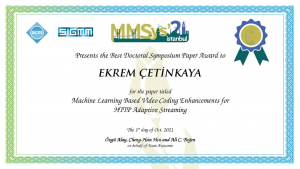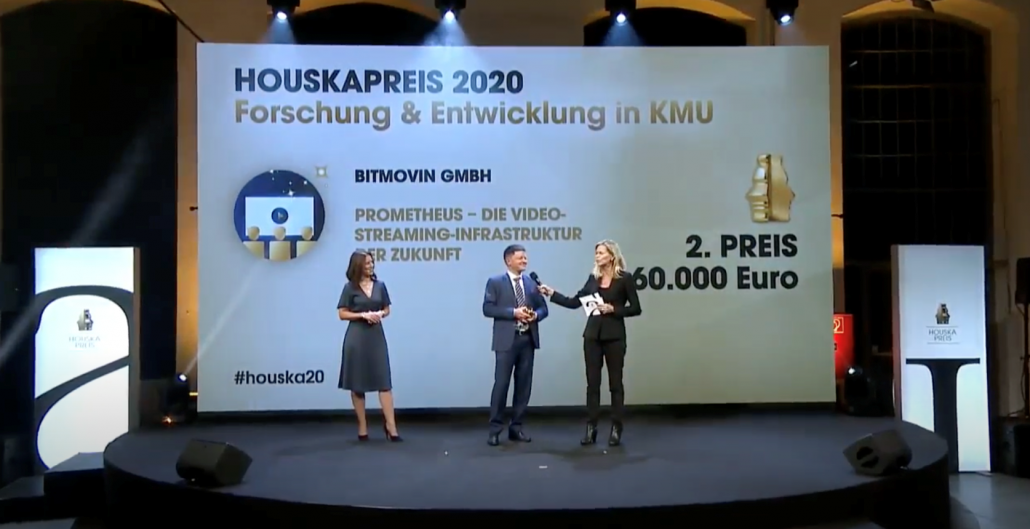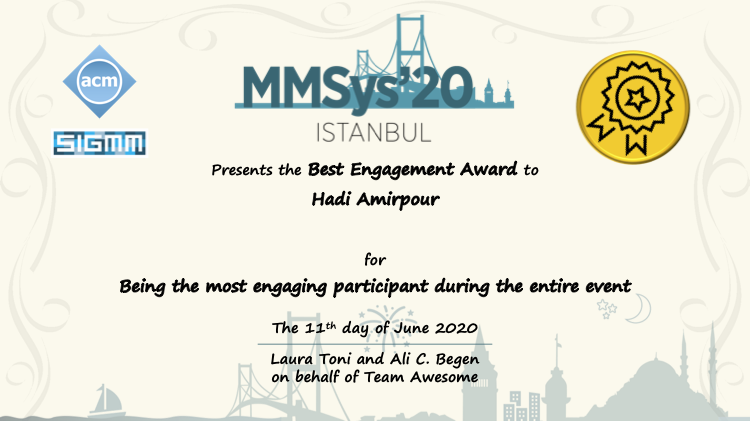Ekrem Çetinkaya got the Best Doctoral Symposium Paper Award at ACM MMSys 2021 for his paper titled “Machine Learning Based Video Coding Enhancements for HTTP Adaptive Streaming”. More information about the paper can be found HERE.

Auszeichnungen von ITEC Mitarbeitern
Ekrem Çetinkaya got the Best Doctoral Symposium Paper Award at ACM MMSys 2021 for his paper titled “Machine Learning Based Video Coding Enhancements for HTTP Adaptive Streaming”. More information about the paper can be found HERE.

With his master thesis about “Animating Characters using Deep Learning based Pose Estimation”, Fabian Schober won the “Dynatrace Outstanding IT-Thesis Award” (DO*IT*TA). The award brings attention to extraordinary theses, motivates creativity, and provides insight into modern technologies.
In his thesis, Fabian Schober focuses on animating 2D (video game) characters using the PoseNet pose estimation model. He delivers a proof of concept on how new machine learning technologies can assist in video game development. Read more at the University press release (German only).

Title: “A Two-Sided Matching Model for Data Stream Processing in the Cloud-Fog Continuum” by: Narges Mehran, Dragi Kimovski and Radu Prodan, was virtually presented in the CCgrid2021 conference.
We at @alpenadriauni are proud of Narges and her work in the @EU_H2020 @DataCloud2020 project awarded at cloudbus.org/ccgrid2021/.
Watch award presentation at: https://www.youtube.com/watch?v=aSnzDpd5Kqc
 We are happy and proud to see Bitmovin among the 72nd Annual Technology & Engineering Emmy® Awards Recipients. The award is received for “Development of Massive Processing Optimized Compression Technologies” which acknowledges Bitmovin’s Encoding product including its reportedly best per-title encoding feature.
We are happy and proud to see Bitmovin among the 72nd Annual Technology & Engineering Emmy® Awards Recipients. The award is received for “Development of Massive Processing Optimized Compression Technologies” which acknowledges Bitmovin’s Encoding product including its reportedly best per-title encoding feature.
Bitmovins press release can be found here and approximately one year we had the official opening ceremony of the ATHENA project that will continue to fed the innovation pipeline with respect to HTTP Adaptive Streaming (HAS) and beyond. Please see our latest publications in this field and in case of questions please do not hesitate to contact us.
September 24, 2020. Bitmovin received 2nd prize of the 2020 Houska Award for the PROMETHEUS project, a joint project with the Alpen-Adria-Universität Klagenfurt funded in part by the Austrian Research Promotion Agency (FFG) in the “Basisprogramm”. The Houska Award is Austria’s biggest private award for application-oriented research and comprises two categories: (i) academic research; (ii) research & development in SMEs. Bitmovin was nominated in the second category and received the 2nd prize of this prestigious award in Austria.
The main objective of PROMETHEUS is to research and develop the next generation video streaming infrastructure to
– enable the efficient and optimized adaptive streaming of bandwidth-hungry interactive video applications – including but not limited to augmented reality, virtual reality, and omnidirectional 360° video – within heterogeneous environments;
– support immersive media applications taking into account recent advances in media coding (i.e., high-dynamic range, white color gamut, and other range extensions) as well as proprietary formats depending on the market needs (e.g., AV1, VP9, etc.);
– provide means to quantify the Quality of Experience (QoE) of the above mentioned applications domains in order to analyze and improve the video quality on the Web.
Project leaders:
– Stefan Lederer and Christopher Müller (Bitmovin)
– Christian Timmerer (Alpen-Adria-Universität Klagenfurt / Bitmovin)
Short videos about the project are available here (in German)
– https://www.youtube.com/watch?v=zcJpG6bz5-w
– https://www.youtube.com/watch?v=m_61kZuIn5Y
Research activities/results of PROMETHEUS can be found here: https://campus.aau.at/cris/project/0f4de0c95dc78fbf015dcc4fe70000c8?lang=en&#links
Further details about the Houska Award can be found here (in German): https://bcgruppe.at/houskapreis/
Faculty of Technical Sciences, University of Klagenfurt nominated Alexander Lercher from ITEC (Radu Prodan‘s group) for Best Performer Award owing to his outstanding performance in studies. He will be conferred with this honor at a public presentation in lecture hall -3 of the University of Klagenfurt on September 16, 2020. In the course of research carried out by the Studies and Examination Department, Alexander was identified as the most successful student in this field of study.
 This year’s ACM MMSys was held as a fully virtual/online event and Slido was used for asking questions about keynotes and presentations including offline discussions with presenters. The interaction report provides some interesting key insights including the word cloud below which provides an overview of this year’s discussion items. Although ACM MMSys 2020 is over, everyone is welcome joining the MMSys Slack workspace where the discussion will continue until ACM MMSys 2021 (available soon!) and hopefully beyond.
This year’s ACM MMSys was held as a fully virtual/online event and Slido was used for asking questions about keynotes and presentations including offline discussions with presenters. The interaction report provides some interesting key insights including the word cloud below which provides an overview of this year’s discussion items. Although ACM MMSys 2020 is over, everyone is welcome joining the MMSys Slack workspace where the discussion will continue until ACM MMSys 2021 (available soon!) and hopefully beyond.
Title: Objective and Subjective QoE Evaluation for Adaptive Point Cloud Streaming
Authors: Jeroen van der Hooft (Ghent University), Maria Torres Vega (Ghent University), Christian Timmerer (Alpen-Adria-Universität Klagenfurt, Bitmovin), Ali C. Begen (Ozyegin University, Networked Media), Filip De Turck (Ghent University), Raimund Schatz (Alpen-Adria Universität Klagenfurt & AIT Austrian Institute of Technology, Austria)
Abstract: Volumetric media has the potential to provide the six degrees of freedom (6DoF) required by truly immersive media. However, achieving 6DoF requires ultra-high bandwidth transmissions, which real-world wide area networks cannot provide economically. Therefore, recent efforts have started to target efficient delivery of volumetric media, using a combination of compression and adaptive streaming techniques. It remains, however, unclear how the effects of such techniques on the user perceived quality can be accurately evaluated. In this paper, we present the results of an extensive objective and subjective quality of experience (QoE) evaluation of volumetric 6DoF streaming. We use PCC-DASH, a standards-compliant means for HTTP adaptive streaming of scenes comprising multiple dynamic point cloud objects. By means of a thorough analysis we investigate the perceived quality impact of the available bandwidth, rate adaptation algorithm, viewport prediction strategy and user’s motion within the scene. We determine which of these aspects has more impact on the user’s QoE, and to what extent subjective and objective assessments are aligned.
Keywords: Volumetric Media; HTTP Adaptive Streaming; 6DoF; MPEG V-PCC; QoE Assessment; Objective Metrics
International Conference on Quality of Multimedia Experience (QoMEX)
May 26-28, 2020, Athlone, Ireland
http://qomex2020.ie/
Authors: Abdelhak Bentaleb (National University of Singapore), Christian Timmerer (Alpen-Adria Universität & Bitmovin Inc,), Ali C. Begen(Ozyegin University), and Roger Zimmermann (National University of Singapore)
Abstract: HTTP adaptive streaming (HAS) with chunked transfer encoding can be used to reduce latency without sacrificing the coding ef- ficiency. While this allows a media segment to be generated and delivered at the same time, it also causes grossly inaccurate band- width measurements, leading to incorrect bitrate selections. To overcome this effect, we design a novel Adaptive bitrate scheme for Chunked Transfer Encoding (ACTE) that leverages the unique nature of chunk downloads. It uses a sliding window to accurately measure the available bandwidth and an online linear adaptive filter to predict the available bandwidth into the future. Results show that ACTE achieves 96% measurement accuracy, which translates to a 64% reduction in stalls and a 27% increase in video quality.
Links:
– Slides/PDF: https://multimediacommunication.blogspot.com/2019/04/acm-nossdav19-bandwidth-prediction-in.html
– DASH Industry Forum Excellence in DASH Award at ACM MMSys 2019: https://multimediacommunication.blogspot.com/2019/06/dash-if-awarded-excellence-in-dash.html